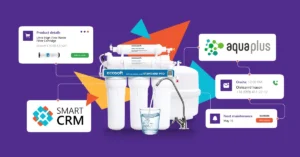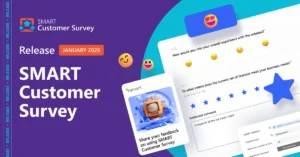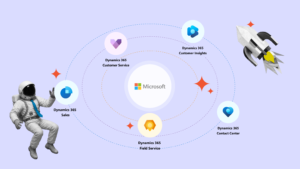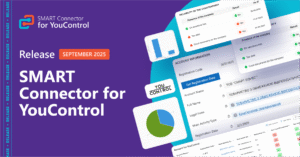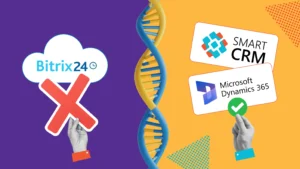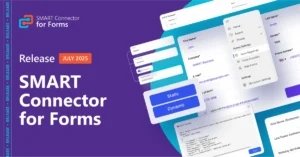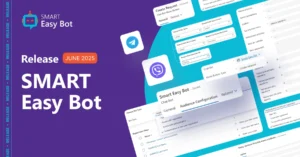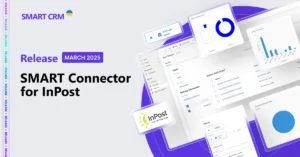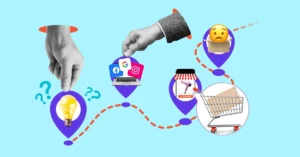CRM for Business: From Spreadsheet Chaos to Structure in Just a Few Clicks
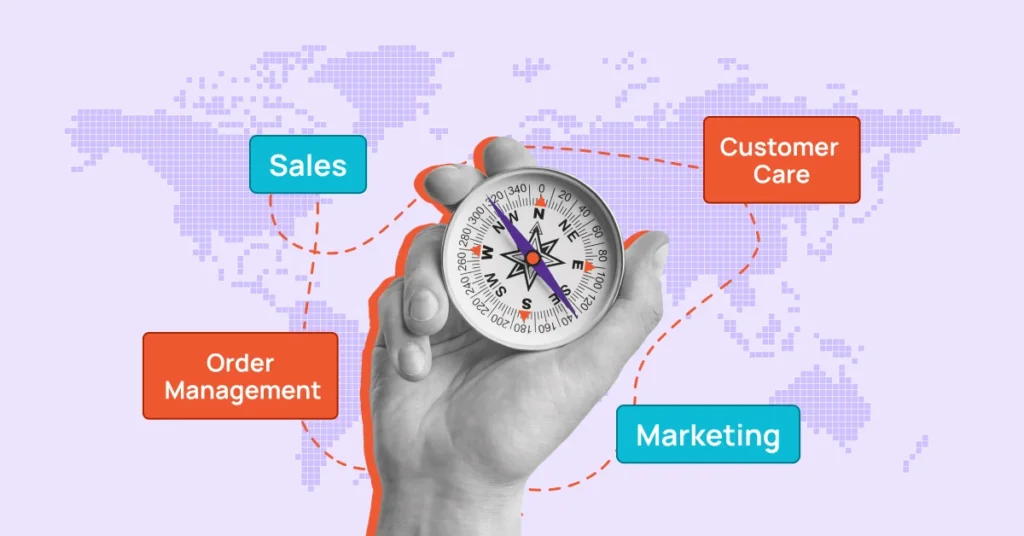
Objectives can be compared to a compass bearing by which a ship navigates. A compass bearing is firm, but in actual navigation, a ship may veer off its course for many miles. Without a compass bearing, a ship would neither find its port nor be able to estimate the time required to get there
*In navigation, a bearing is, simply put, the direction indicated by the compass.
According to this analogy from Peter Drucker, a founder of modern management, business is like a merchant ship navigating stormy seas – tossed by waves of shifting demand, heading toward hyper-personalization, global market expansion, and entry into new regions. To avoid getting lost in the storm of business processes, companies need more than just a strategic course – they need a reliable navigation system. Such a system helps steer every customer and partner interaction, build trust, and earn loyalty, all while keeping critical details in focus. This is exactly how a CRM system works for business: it locks the course onto the customer, helps retain them, and keeps you on target. A CRM is like the compass bearing in the world of customer experience. Without it, it’s easy to lose the connection, timing, context – and ultimately, the customer.
So, what is CRM in business?
A CRM system (Customer Relationship Management) is software that serves as a strategic tool, enabling a company to build long-term, mutually beneficial relationships with its customers. CRM for business acts as the digital brain of the sales, marketing, and customer service teams. It ensures no inquiry goes unnoticed, helps better understand customer needs, and enables timely responses. CRM records the full history of customer interactions – who asked what, when they reached out, and where the deal currently stands – and turns that chaos into a structured system. It tells you when to call, what to offer, and how to keep the customer engaged.
Want to know how to choose the CRM for business that truly matches your goals and needs? Let’s explore in more detail!
In Which Business Areas Are CRM Systems Used, and What Functionality Should Modern Solutions Provide?
Today’s CRM systems for business go far beyond just the sales department. They’ve become comprehensive tools that bring together marketing, service, analytics, communication, and even team management. Let’s explore the key business areas where CRM brings the most value.
Business Areas Where CRM Is Applied
A CRM system supports several key areas of business at once:
- Sales – Modern CRMs provide full control over the sales cycle – from the first contact with a potential customer to signing the contract. The system can automatically capture inquiries from multiple channels, help qualify leads, assign responsible managers, manage deals in stages, create tasks and reminders, store interaction history, and integrate document workflows. As a result, it enables structured sales, ensures no opportunity is missed, and supports effective decision-making based on up-to-date data.
- Marketing – CRM for business significantly expands marketing capabilities – from basic lead collection to launching personalized campaigns. A CRM allows you to segment audiences by interests, behavior, and funnel stage. Solutions like SMART CRM enable you to configure messaging workflows, automatically launch email or SMS campaigns at the right time, and track results. With integration of websites, messengers, and ad channels, marketing becomes more creative, controllable, and measurable.
- Customer Service – CRM systems fundamentally transform how businesses approach customer support. Instead of chaotic responses and lost inquiries, CRM functionality builds a structured support system. With SMART CRM, all customer requests – submitted via website forms, messengers, email, or phone – are automatically recorded in a single database, where nothing gets lost and everything is prioritized and processed accordingly. Managers can quickly retrieve interaction histories and offer solutions from a knowledge base, while adhering to SLAs (Service Level Agreements).
- Team Collaboration – CRM for business is not only about working with customers – it’s also a tool for efficient internal teamwork. A modern CRM allows you to assign tasks, appoint responsible team members, track task statuses, and manage deadlines effectively. Built-in analytics tools help assess each employee’s workload and productivity. As a result, the company experiences less chaos and more coordinated steps toward shared goals.
- Analytics – Reporting and analytics tools in CRM systems empower businesses to make decisions based on real data – not just intuition or assumptions. This means every action – from planning a marketing campaign to optimizing the sales process – is backed by processed and analyzed data. This approach allows companies to better predict future trends, identify issues early, and quickly adapt their strategy. It reduces the risk of error and increases overall business efficiency.
- IT Infrastructure – Modern CRM systems like SMART CRM or Microsoft Dynamics 365 Sales support flexible integration with other corporate platforms. This creates a unified ecosystem for managing data and business processes. Cloud access makes it possible to work with the CRM system from anywhere, not just the office, ensuring mobility and flexibility. Additionally, security remains a top priority: two-factor authentication, access rights management, and reliable data storage protect against unauthorized access, which is crucial for maintaining the confidentiality and integrity of sensitive information.
That’s why, to be truly effective across these business areas, a CRM system must meet specific functional requirements.
What Should a Modern CRM for Business Be Capable Of?
Let’s explore the essential capabilities a modern CRM system must offer to become a powerful tool for your company.
- 360-Degree Customer View – Your CRM should serve as the single source of truth about each customer by providing:
- A centralized customer database containing the entire history of deals, purchases, inquiries, and requests.
- Personalization tools for capturing customer preferences, enabling segmentation and targeted engagement.
- Automatic tracking of communications – emails, calls, chats, and web form submissions – all in one place.
- Automation of Sales, Service, and Marketing – A modern business CRM must eliminate manual tasks by intelligently automating workflows, including:
- Lead generation management – automatic collection of leads from various sources such as websites, social media, chatbots, and ads.
- Campaign automation – tools for setting up and running targeted email and SMS campaigns triggered by predefined scenarios. This allows for personalized customer communication and reduces the time spent on routine tasks.
- Customer service automation using a knowledge base to quickly provide answers to frequently asked questions.
- Integration with Third-Party Services – Your CRM system shouldn’t operate in isolation – it should seamlessly support:
- Synchronization with popular messengers like WhatsApp, Telegram, Facebook Messenger, Viber, Instagram, etc.
- Integration with your ERP, accounting, and financial systems to keep track of finances and inventory.
- API support for custom integrations, ensuring flexibility in connecting to internal platforms.
- Analytics and Artificial Intelligence (AI) – Data is one of a company’s most valuable assets – provided it’s used effectively. Your CRM should offer:
- Real-time dashboards and analytics with tracking of key metrics such as conversion rates and sales performance.
- AI-powered sales forecasting by analyzing customer data and behavior patterns.
- Automatic lead categorization based on behavior and needs.
For instance, McKinsey & Company shares a case study of a leading real estate company that integrated AI into its CRM system. As a result, customer communications were automated, boosting conversion rates by 25% and reducing the need for human involvement in 87% of cases.
- Omnichannel Communication – Customers may reach out via Instagram, call, or submit a request through a feedback form. Your CRM should unify all these channels:
- A single communication hub with chats, calls, emails, and messengers in one interface.
- Integrated telephony with features like call recording, playback, and analytics.
- Chatbots and autoresponders to handle frequent and popular requests automatically.
McKinsey & Company notes that today’s customers interact with brands across more than 10 channels, with two-thirds preferring digital or remote experiences. Companies that quickly implement self-service and automation tools – such as CRMs with self-service capabilities – can significantly boost sales potential and free up valuable team resources. One multinational company, for example, launched an additional online channel and generated over 500 new sales opportunities while easing team workloads during the COVID-19 pandemic.
- Task and Team Management – Your CRM should be a workspace for the whole team, equipped with tools like:
- Calendars, reminders, and task managers to schedule meetings, highlight important dates, and assign tasks.
- Performance tracking through activity analytics and team productivity metrics.
- A built-in learning system, enabled through a centralized knowledge base.
- Mobile Access and Cloud Availability – Your CRM must be convenient and accessible regardless of a user’s location or work format. This requires:
- Full access to information from a phone or tablet.
- The ability to work from anywhere thanks to cloud data storage.
- Two-factor authentication and flexible access rights to protect company data.
- Flexibility and Scalability – It’s simple: as your business grows, your CRM must grow with it. Key considerations include:
- Customizability to align with your company’s business processes – configurable interfaces and workflow automation.
- Easy scalability to support new countries, branches, and users.
- A flexible permissions system that allows for role-based access (e.g., for managers, marketers, or sales teams).
CRM Benefits for Business: What Results Can You Expect with the Right Solution?
So, why is having a CRM important to a business? Implementing a CRM system enables businesses to achieve tangible results that directly impact financial performance. CRM adoption supports the achievement of key company goals.
Increased Sales and Profitability
CRM in business helps manage leads more efficiently, reduce customer attrition, and improve conversion rates at every stage of the sales funnel. Automating routine tasks frees up managers’ time, allowing them to focus more on client interactions and deal closures. By leveraging up-to-date data, CRM solutions enable customer behavior forecasting, supporting data-driven decision-making and more effective strategic planning.
Enhanced Customer Interaction
With all contacts, interaction history, purchases, and requests stored in a single system, the risk of losing important customer information is minimized. For instance, the modern SMART CRM solution consolidates all communication channels – email, messengers, telephony, and social media – ensuring seamless customer engagement. According to McKinsey & Company, companies that adopted omnichannel solutions using modern technologies achieved a 13.5% increase in EBIT (Earnings Before Interest and Taxes).
Additionally, CRM tools allow for analyzing customer preferences and setting up personalized offers, enhancing customer satisfaction and loyalty. This enables faster responses to inquiries, resulting in improved service and stronger client relationships.
Improved Operational Efficiency
A CRM in business can automate daily tasks, provide transparency in tracking and completing assignments, and streamline internal workflows. As a result, businesses can reduce labor costs, shorten the time spent on repetitive operations, and lower the risk of financial losses due to inefficiencies or poor decisions.
Increased Company Revenue
All the above factors combined lead to higher company revenues through cost reduction, improved sales efficiency, and a better customer experience. Numerous studies cited by McKinsey & Company indicate that adopting advanced technologies and sales automation can reduce costs and increase company revenue by up to 20%.
What Types of CRM Systems Exist for Specific Business Processes, and How to Choose the Right One?

The choice of a CRM for business depends on the company’s area of focus, scale, and the team’s goals. CRM system classification helps identify which solutions are best suited for automating specific business processes – from sales to marketing and customer service.
CRM Systems for Different Business Processes
Depending on a company’s objectives, the market offers solutions that can help increase sales, improve customer communication, or streamline service request management.
Sales Automation CRM
Speed, clarity, and control at every stage of the sales funnel are essential for successful sales operations, and CRM systems for sales are designed to build and optimize these processes.
What such a CRM provides:
- End-to-end control over every stage of the deal within a unified workspace.
- Increased efficiency in working with clients to ensure no lead gets lost.
- Automated reporting on the sales funnel.
- Tracking communication history with each contact.
Best suited for:
- B2B companies with long sales cycles.
- Businesses using multiple lead generation channels.
- Companies with large sales departments.
One example of such a solution is SMART Sales, which automates B2B sales processes – from lead acquisition to deal closure.
Marketing Automation CRM
Modern marketing goes far beyond email newsletters and social media pages. It now encompasses a much broader set of processes. A modern CRM for marketing helps align activities with business goals – such as boosting sales, increasing customer loyalty, and improving repeat purchase rates.
What such a CRM can do:
- Help segment customers.
- Automate mailings and communications.
- Launch personalized campaigns effortlessly.
- Create template libraries for various communication channels.
- Provide advanced analytics tools for monitoring and evaluating marketing activities.
Best suited for:
- Companies aiming to increase customer loyalty.
- Businesses looking to combine marketing and analytics in a single solution.
To meet these needs, we recommend SMART Marketing, a solution for managing omnichannel marketing communications and delivering a consistent, cohesive customer experience.
Service Process Automation CRM
For service-based businesses, it’s crucial to quickly handle requests, maintain interaction history, and monitor task completion. In this case, a service-focused CRM emphasizes fast request management, transparent service processes, and efficient team collaboration.
What such a system provides:
- Automation of request and order tracking.
- Task distribution by assignee.
- Tools for managing deadlines, SLAs, and payments.
- Centralized storage of documents and templates for streamlined customer interactions.
Best suited for:
- Service companies with recurring orders.
- Businesses handling a high volume of customer requests.
- Companies aiming to automate internal interdepartmental communication.
For example, SMART Customer Care is specifically designed to support service teams. It enables effective request management, optimizes internal workflows, and ensures transparency at every stage of customer interaction.
Does Industry Influence the Choice of Business CRM Software?
Some CRM platforms do offer industry-specific versions – one tailored for agriculture, another for retail, and yet another for IT companies. This segmentation allows businesses to get a solution that’s partially pre-configured for their specific needs. However, there’s a downside: such CRMs are often harder to adapt when a company changes its business model or expands beyond a single industry. SMART CRM is a flexible system designed around business processes rather than industry templates. Its logic is organized by function – B2B and B2C sales, marketing, customer service, and internal collaboration. This means SMART CRM works equally well across various sectors, including professional services, manufacturing, education, agribusiness, IT, retail, non-profit an charitable organizations, and more.
Does Business Size Influence the Choice of CRM System?
When choosing a CRM, what matters most isn’t the company’s size or number of branches, but the goals it aims to achieve. If a business has a large customer base and prioritizes personalized communication, it should consider robust solutions with extensive functionality. A prime example is the SMART business project implemented for the BROCARD network. The client adopted an ecosystem based on Microsoft Dynamics 365 products – Sales, Customer Insights Journeys, Customer Insights Data, Customer Voice, and Customer Service. This comprehensive setup helped BROCARD consolidate all consumer data sources, build complex segmentation, and transition to personalized communication – ultimately enabling a tailored approach to 1.8 million customers.
At the same time, even a company with an international presence can opt for a more compact CRM platform if speed, adaptability, and ease of use are the primary objectives. A great case in point is SMART business’s project with Nova Post. As part of it, SMART CRM was implemented for the client’s European branches. Within the first few months, the system handled 500 requests and 3,500 calls daily, providing the sales and contact center teams with a unified digital environment that could scale rapidly as the company grew.
That’s why a CRM for business should be selected based on the company’s specific needs, not its size – sometimes versatility and agility outweigh raw functionality. And if your business processes are truly unique and off-the-shelf solutions require excessive time and resources to adapt, SMART business can help you build a custom solution powered by Microsoft Power Platform.
Which CRM System Should You Choose for Your Business – and What Are the Alternatives to russian-Origin Software?
The global trend toward eliminating russian products, services, and narratives from the civilized space is now a necessity. Its destructive impact on global security is obvious. Since 2022, the number of russian cyberattacks has increased not only against Ukraine but also its allies – EU and NATO member states. According to Western intelligence agencies, the targets include not only critical infrastructure and government institutions but also businesses. Russia poses a threat of cyber warfare to the entire world, and the rise in attacks before the onset of full-scale hostilities is already a recognizable pattern of the aggressor state. For instance, russia launched cyberattacks on the government websites and media outlets of Sakartvelo – which preceded the military assault on the country. The same scenario played out in Ukraine at the onset of the Revolution of Dignity.
Russian companies cannot operate independently of the state, which is waging a full-scale war against Ukraine and systematically violating international law. By purchasing or continuing to use software of russian origin, businesses are effectively contributing to the funding of the aggressor state – and thereby supporting global instability. Against this backdrop, using russian software products like Bitrix24, AmoCRM, RetailCRM, KommoCRM, or Megaplan appears less like a technological solution and more like a deliberate risk. None of the russian CRM systems can guarantee compliance with international standards for data protection, cybersecurity, or transparency. In a country where businesses are legally obligated to hand over data upon request from security services, there can be no true confidentiality or secure storage of corporate information.
That’s why more and more companies are abandoning hostile software in favor of trusted solutions that comply with international requirements. As a secure alternative, SMART business offers its proprietary solution – SMART CRM – built on Microsoft Power Platform. Moreover, SMART business is a Microsoft Gold Partner and has deep expertise in implementing Microsoft Dynamics 365 – a platform that meets international security standards, scales to businesses of any size, and integrates with other Microsoft products to build a unified digital ecosystem. The platform helps manage leads effectively, automate sales processes, improve customer interactions, and generate clear, in-depth analytics. Both systems offer not only advanced CRM functionality but also robust security and compliance with global security standards.
How to Ensure Successful Business CRM Software Implementation for your Business?
Implementing CRM in business is an opportunity to make your customer interactions more structured, transparent, and efficient. When approached with a clear understanding of the company’s goals and business logic, the system won’t be a burden for your team – on the contrary, it will become a reliable assistant.
Tip 1 – Start with goals, not the system
Before searching for a CRM, take a moment to answer a few questions: What exactly do you want to improve? Are sales moving fast enough? Are leads getting lost after the first contact? Are managers returning every call? And so on.
Each of these issues points to a specific goal, which can be measured using KPIs. For example, if you’re concerned about customer churn, your CRM should help track the dates of the last interactions and remind you when it’s time to reconnect.
Tip 2 – Choose the system and vendor that suit you
The “pick the most expensive – can’t go wrong” approach doesn’t always work. The ideal business CRM software isn’t the one with the most features – it’s the one that supports your processes and scales easily with your business.
At the same time, success depends on synergy between the customer and the vendor – a reliable partner who understands your domain and knows how to align the software with your company’s processes. For example, low-code/no-code platforms make it easy to adapt the system to your workflows without a large developer team or deep technical expertise.
Tip 3 – Don’t try to fix chaos with a CRM
A CRM in business isn’t a magic fix. If your internal processes are messy and unstructured, it’s best to address that before implementation. Map out the customer journey, identify what can be automated, and eliminate inefficiencies. For instance, if managers aren’t logging communication history, you can configure automatic tracking. The goal is for the CRM to streamline current processes – not add extra work.
Tip 4 – Communicate the clear benefits to your team
Even the most suitable system is worthless if your team sees it as just another complication. That’s often the first reaction to change. Involve people early in the process: pick internal ambassadors, run brief hands-on training sessions. Most importantly, show real benefits – not abstract value. For example:
“Thanks to this system, you’ll save 2 hours every day – so you can focus on the clients who actually bring you results”. Or: “You won’t have to remember who to call and when – you won’t miss key contacts, you’ll retain more leads, and you’ll meet your KPIs, which directly impacts your bonuses and income”.
Tip 5 – Automate the key processes
A good CRM system doesn’t require action – it prompts and helps. It reminds you when to call and whom, creates tasks automatically after a website inquiry, pulls in analytics. If employees have to enter data from forms manually or fill in fields that might never be used, the system quickly becomes a burden for the whole team.
Tip 6 – Integrate your CRM with other company tools
Your business CRM software should not work in isolation – it’s crucial that it supports integrations with your ERP, EDMS, BI systems, etc. The ideal scenario looks like this: a client submits a request → CRM automatically creates a record → the manager sees the task immediately → the call is logged → data flows into analytics – no extra steps!
Tip 7 – Use the data – don’t just store it
CRM isn’t an archive – it’s a strategic tool for decision-making. If analytics show that 80% of leads are lost after the first contact – that’s a signal: maybe the call script isn’t working, or maybe the first response comes too late, when interest has faded. Your CRM data shouldn’t just accumulate – it should be analyzed regularly to guide decisions and drive outcomes.
Tip 8 – Monitor and optimize continuously
A CRM is a dynamic tool that needs ongoing refinement. Every quarter, check: Are managers filling all required fields? Have new processes emerged that aren’t yet covered by the system?
Sometimes a small tweak – like adding or removing a field – can save dozens of hours.
With over 16 years of experience working across business models, industries, and company sizes, SMART business understands the unique needs of each client and develops solutions that address the challenges faced by the global business community.
Submit a request – and SMART business will help you choose a CRM system that integrates seamlessly with your current business processes, improves client management, and supports your growth at every stage!
